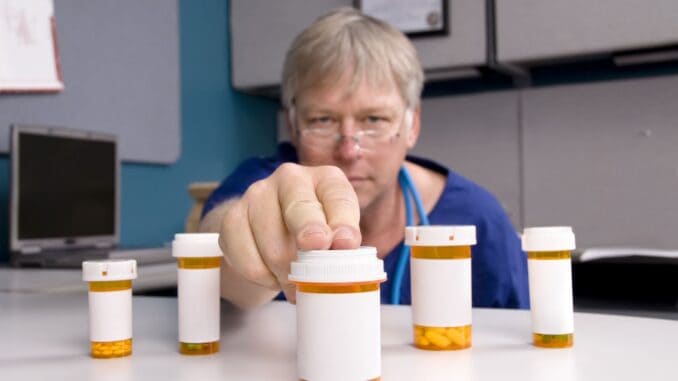
These are the 5 Big Pharma treatments that I would try to avoid at all costs…
Unsubscribe | Report as spam | Change email preferences
—-Important Message—-
Are you taking one of these 5 dangerous treatments?
I’ve discovered 5 Big Pharma treatments for men that are actually making men SICKER…
It seems crazy, but not all treatments are safe, despite doctors giving them out.
And it’s not the doctor’s fault… it’s the companies who make these treatments.
Like Bayer and Johnson and Johnson, the makers of Xarelto…
They finally settled for close to $800 million for failing to warn men about deadly bleeding episodes caused by Xarelto.
And believe it or not, there are so many more Big Pharma companies doing the same thing…hiding dangerous side effects…
So do me a favor and check your bottles real quick…
———-
Warning – talk to your doctor asap about these 5 scripts
Big Pharma treatments can cause a lot of problems.
You often find that once somebody is on 1 treatment, they end up being given more and more to deal with increasing side effects.
Sexual problems are quite often caused by treatments.
Finnish researchers decided to look at the effect of treatments given to mitigate cardiovascular disease…
…to see if they were associated with increased rates of erections problems.
Some of these treatments can more than double the likelihood of a man suffering from poor rockiness.
What’s more, many of these treatments are used to lower blood pressure – which really isn’t the problem it’s made out to be in older guys.
Some of these treatments don’t seem to increase the likelihood of erections problems at all.
The human research was carried out at the University of Tampere in Finland. This paper was published in the International Journal of Impotence Research.
“It is unclear whether high blood pressure per se or antihypertensive ‘treatment’ use causes ‘penile dysfunction.’”
The researchers looked at links between cardiovascular diseases and treatments used to deal with these diseases in relation to the onset of erections problems.
“The aim of this study was to investigate the effect of cardiovascular diseases and their concomitant ‘treatments’ use on the incidence of ‘penile dysfunction.’”
The researchers analyzed data from Finnish men in their 50s, 60s or 70s.
“The target population consisted of men aged 55, 65 or 75 years old residing in the study area in Finland in 1999.”
The researchers approached almost 3000 men to take part in the study which consisted of answering a number of questionnaires.
Not all responded to all of the questionnaires.
“Questionnaires were mailed to 2837 men in 1999 and to 2510 of them 5 years later. The follow-up sample consisted of 1665 men who responded to both baseline and follow-up questionnaires.”
In the end, the researchers had 1,000 men for the study, men who did not have major erections problems at the outset.
“Men free of moderate or severe ‘penile dysfunction’ at baseline (N=1000) were included in the study.”
Rockiness problems were assessed by means of a very simple questionnaire.
“ED was assessed by two questions on the subject of ability to achieve or maintain a ‘boner’ sufficient for intercourse.”
Overall, men who were treated for high blood pressure or heart disease were much more likely to develop erections problems.
“The risk of ‘penile dysfunction’ was higher in men suffering from treated hypertension or heart disease than in those with the untreated condition.”
Non-selective beta blockers increased the risk of poor erections by 70%.
Diuretics increased the risk of poor erections by 30%.
Calcium channel inhibitors were associated with a 60% increase.
Angiotensin II antagonists (ARB) seem to more than double the risk of poor erections – increasing the likelihood by 120%.
“The risk of ‘penile dysfunction’ was higher in men using calcium channel inhibitor (RR=1.6), angiotensin II antagonist (RR=2.2), non-selective β-blocker (RR=1.7) or diuretic (RR=1.3) compared with non-users.”
Some other treatments used for the same problems didn’t show any relationship with future risk of poor erections at all.
These include ACE inhibitors and selective beta blockers.
“‘Penile dysfunction’ was not associated with using organic nitrates, ACE inhibitors, selective β-blockers and serum lipid-lowering agents.”
The idea that erections problems are a psychological issue has long been disproven – but it is still widely believed…
…even though we know that this condition is mostly caused by poor metabolic health or treatments.
The research also indicates that blood pressure-lowering treatments aren’t really helpful in the first place.
And if you do need to take these treatments you should be aware that there are different options…
…and the risk of side effects, including erections problems, are very different for different treatments.
“In summary, calcium channel inhibitors, angiotensin II antagonists, non-selective β-blockers and diuretics may increase the risk of ‘penile dysfunction.’”
You should always consult your healthcare practitioner for guidance on medical diagnosis and treatment.
—-Important Message—-
Men are using this Himalayan secret to avoid tissue hypoxia and increase blood-oxygen levels (especially down there)
I’ve discovered that Himalayan people, who live at some of the highest altitudes in the world…
…have higher blood oxygen levels than normal men…
And this is extraordinary because most people in high altitudes suffer from what’s called “tissue hypoxia.”
Tissue hypoxia is when the cells are literally starving for oxygen.
But these men in the Himalayas — they have super high oxygen levels all over their body, even down there…
…especially down there!
And this is important for men because the penis needs good, high oxygen levels to get rocky.
Without enough oxygen, the member will stay soft and flaccid.
So I’ve been studying what these Himalayan men are doing…
…and I’ve found a way to naturally boost blood oxygen levels, especially down there (works in 7 minutes or less)
———-




